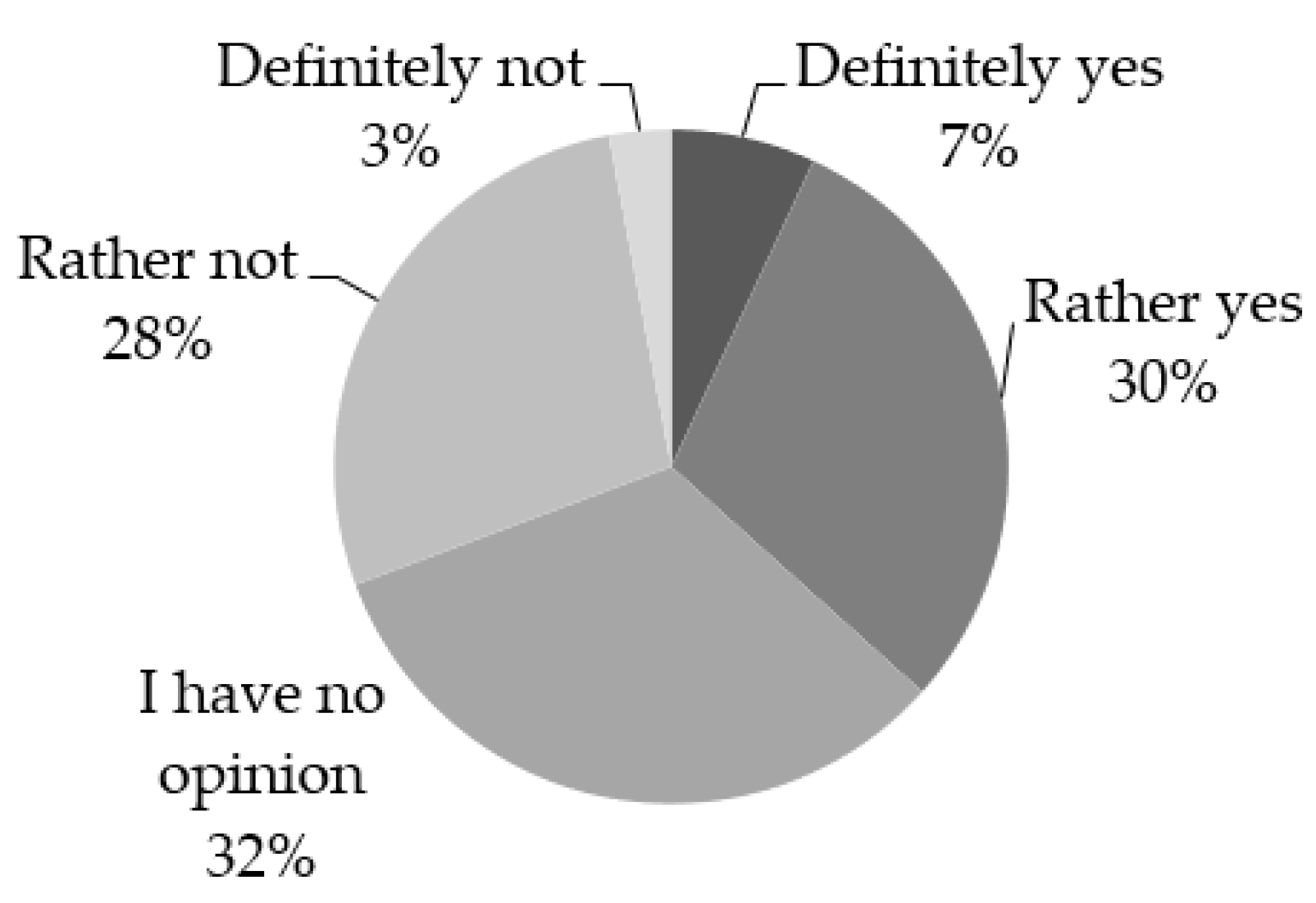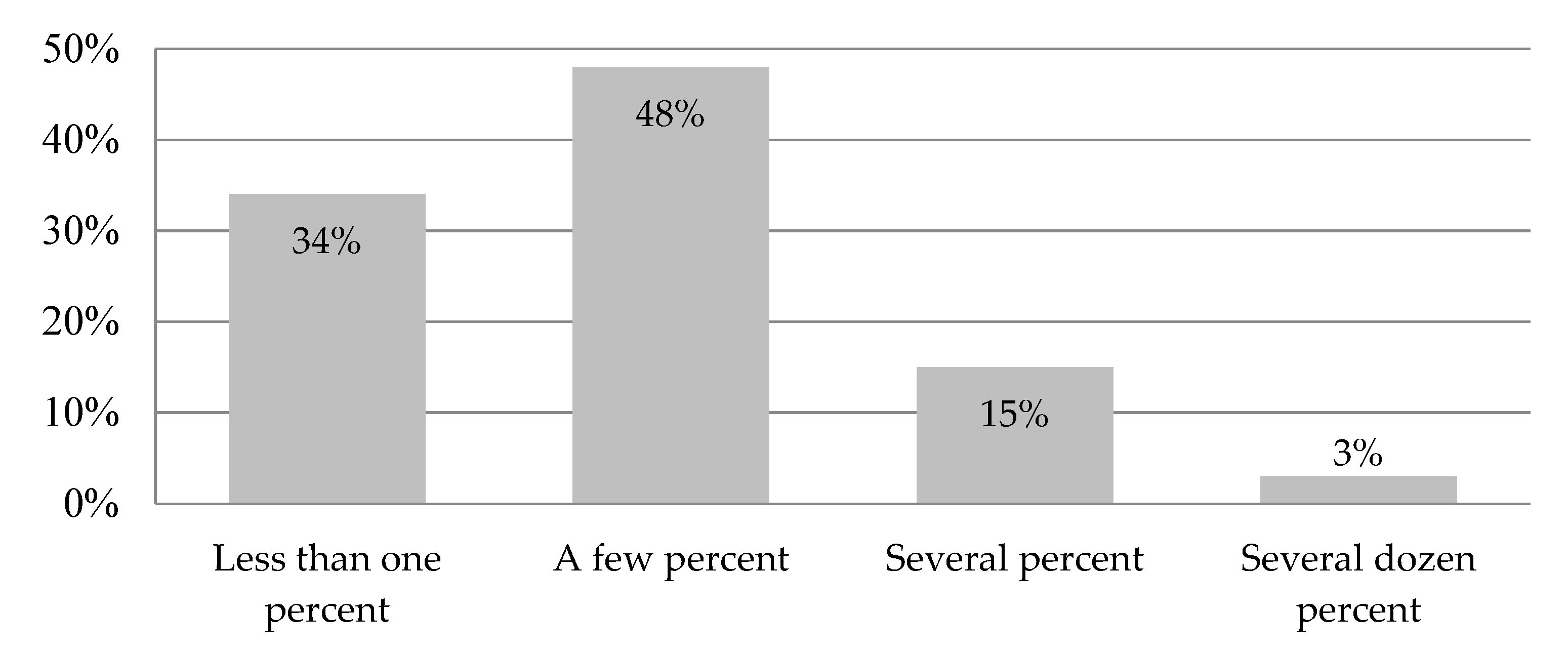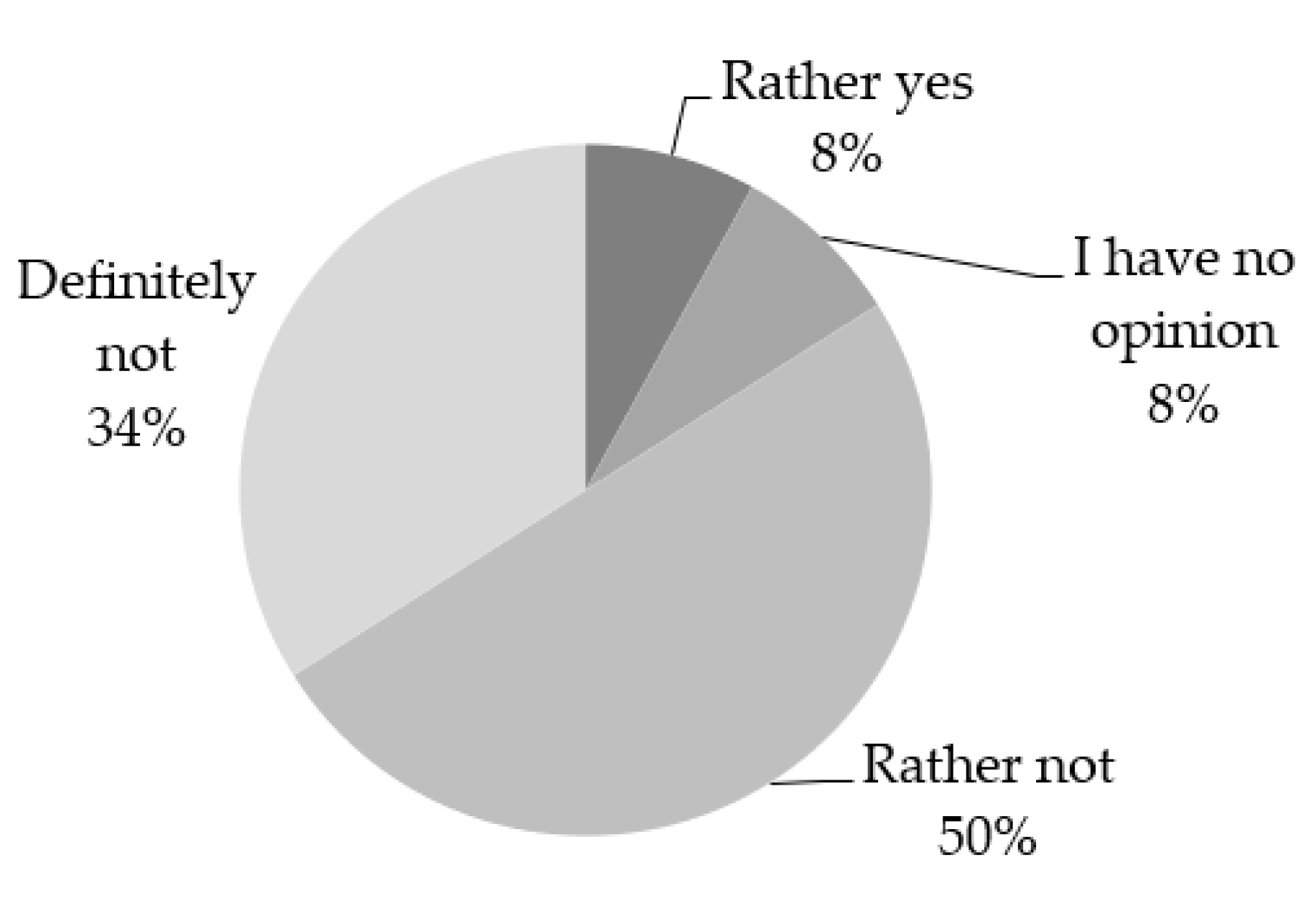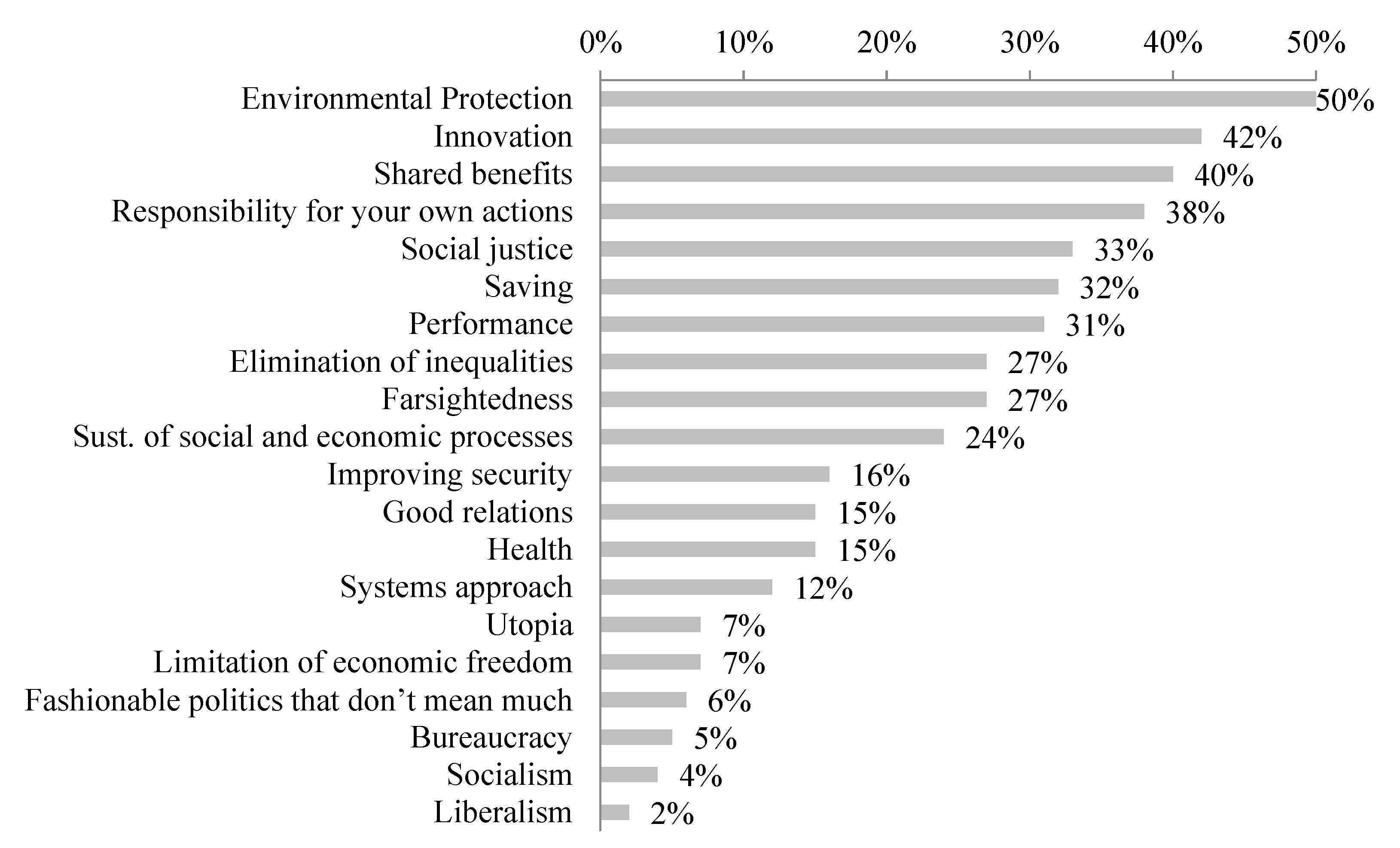The Idea of Sustainable Development and the Possibilities of Its Interpretation and Implementation
Abstract
:1. Introduction
2. Theoretical Background
2.1. Dilemmas Concerning the Essence of the Concept of Sustainable Development
2.2. Initiatives in the Field of Education for Sustainable Development
3. Materials and Methods
- Are the considerations on changing the legally binding definition of SD justified?
- What percentage of adult Poles would be able—when asked in the street—to provide an interpretation of the legally binding definition of SD?
- Can the scope and forms of promoting the idea of SD in the media be considered sufficient for Polish society to be sensitised and well-informed in this matter?
- What is the basic knowledge of Polish society about SD?
- How is the implementation knowledge of Polish society about SD?
- Do you know what SD is all about? What is the essence of SD?
- Have you encountered the problems of SD in your education?
- Do you try to live in accordance with the principles of SD?
- If possible, indicate which of the following terms are most associated with SD for you.
- equal costs of misclassifications;
- goodness of fit assessed according to the Gini measure;
- trimming on misclassification error as stop rule;
- at least 20 observations in each node of the tree;
- quality control of results using 5-fold cross-validation for V = 10.
4. Results and Discussion
4.1. Expert Opinions
4.2. Knowledge, Opinions and Attitudes of Students
5. Conclusions
Author Contributions
Funding
Institutional Review Board Statement
Informed Consent Statement
Data Availability Statement
Conflicts of Interest
References
- Domeradzki, P. Sustainable development as a new ethic of the future. Kult. I Eduk. 2010, 4, 7–20. [Google Scholar]
- Poskrobko, B. The paradigm of sustainable development as the leading standard in the research on new spheres of economics. Ekon. I Sr. 2013, 3, 10–24. [Google Scholar]
- Kuder, D. New models of economic growth and paradigm of sustainable development. Nierówności Społeczne A Wzrost Gospod. 2014, 38, 27–39. [Google Scholar]
- Matysiak, A.; Struś, M. Paradigma of sustainable development. Studia Ekon. 2015, 213, 11–22. [Google Scholar]
- Zadroga, A. Sustainable development as a paradigm of socio-economic development. In Research Spaces of Young Scientists. Inspiration-Innovation-Implementation, 1st ed.; Wyd. Katolickiego Uniwersytetu Lubelskiego: Lublin, Poland, 2016; pp. 11–24. [Google Scholar]
- Ustawa z dn. 27.04.2001 r. Prawo Ochrony Środowiska (Act of April 27, 2001 Environmental Protection Law) (Dz. U. 2020 poz. 1219). Available online: https://isap.sejm.gov.pl/isap.nsf/DocDetails.xsp?id=WDU20200001219 (accessed on 19 May 2022).
- Dacko, M.; Płonka, A.; Satoła, Ł.; Dacko, A. Sustainable Development According to the Opinions of Polish Experts. Energies 2021, 14, 5325. [Google Scholar] [CrossRef]
- Dacko, M. Koncepcja zrównoważonego rozwoju w naukach ekonomicznych–inspiracje, ewolucja, perspektywy. In Natura 2000 Jako Czynnik Zrównoważonego Rozwoju Obszarów Wiejskich Regionu Zielonych Płuc Polski, 1st ed.; Bołtromiuk, A., Kłodziński, M., Eds.; IRWiR PAN: Warszawa, Poland, 2011; pp. 19–42. [Google Scholar]
- Sandner, J. Zrównoważony Rozwój Szansą dla Ludzkości; Wyd. Uniwersytetu Kardynała Stefana Wyszyńskiego: Warszawa, Poland, 2008. [Google Scholar]
- Płonka, A.; Dacko, M. Determinants of academic youth’s attitudes towards the idea of sustainable development. In Economic Science for Rural Development: Proceedings of the International Scientific Conference, 1st ed.; Auzina, A., Ed.; Latvia University of Agriculture: Jelgava, Latvia, 2019; pp. 208–214. [Google Scholar]
- Płonka, A.; Dacko, M. Secondary school youth and the idea of sustainable development–opinions and attitudes. Sci. Pap. Sil. Univ. Technol. Organ. Manag. 2019, 139, 489–502. [Google Scholar]
- Dacko, M.; Mickiewicz, P.; Płonka, A. The role of education in shaping attitudes of academic youth towards sustainable development. Eur. Res. Stud. J. 2021, XXIV, 187–197. [Google Scholar] [CrossRef]
- Rokicka, E.; Woźniak, W. W kierunku Zrównoważonego Rozwoju. Koncepcje, Interpretacje, Konteksty; Uniwersytet Łódzki: Łódź, Poland, 2016; pp. 10–11. [Google Scholar]
- Stanny, M.; Czarnecki, A. Zrównoważony Rozwój Obszarów Wiejskich Zielonych Płuc Polski: Próba Analizy Empirycznej; Instytut Rozwoju Wsi i Rolnictwa Polskiej Akademii Nauk: Warsaw, Poland, 2011; pp. 13–16. [Google Scholar]
- Jacobs, M. 1995: Sustainable Development–From Broad Rhetoric to Local Reality. In Proceedings of the Conference Proceedings from Agenda 21 in Cheshire, Chesire County Council, Cheshire, UK, 1 December 1994. Document No. 49. [Google Scholar]
- Carroll, B. Sustainable Development: An Eclectic View. CIWEM, International Directory; Cameron Publishing: London, UK, 2003. [Google Scholar]
- Mensah, J. Sustainable Development: Meaning, History, Principles, Pillars, and Implications for Human Action: Literature Review. Cogent Soc. Sci. 2019, 5, 1653531. [Google Scholar] [CrossRef]
- Zabłocki, G. Rozwój Zrównoważony–Idee, Efekty, Kontrowersje; Wydawnictwo Naukowe Uniwersytetu Mikołaja Kopernika: Toruń, Poland, 2002; pp. 46–53. [Google Scholar]
- Latoszek, E. Koncepcja zrównoważonego rozwoju w teorii i praktyce ONZ. In Zrównoważony Rozwój a Globalne Dobra Publiczne w Teorii i Praktyce Organizacji Międzynarodowych, 1st ed.; Latoszek, E., Proczek, M., Krukowska, M., Eds.; Wydawnictwo Szkoły Głównej Handlowej: Warszawa, Poland, 2016; pp. 25–65. [Google Scholar]
- Jeżowski, P. Rozwój zrównoważony i jego nowe wyzwania. Kwart. Kol. Ekon.-Społecznego Studia I Pract. 2012, 2, 101–102. [Google Scholar] [CrossRef]
- Redclift, M.R. Rozwój zrównoważony (1987–2005)–oksymoron czasu dorastania. Probl. Ekorozw. 2009, 4, 33–35. [Google Scholar]
- Papuziński, A. Realizacja zrównoważonego rozwoju. Probl. Ekorozw. 2001, 6, 109. [Google Scholar]
- Müller, M. Investitionsentscheidungen vor dem Hintergrund einer Nachhaltigen Entwicklung. Control. Manag. Rev–Sonderh. 2004, 1, 97–99. [Google Scholar]
- Marczak, Ł. Problem wieloznaczności pojęcia “zrównoważony rozwój”. Studia Gdańskie 2015, 36, 167–180. [Google Scholar]
- Schmidt, B. Soziale Nachhaltigkeit bei der Lieferantenauswahl: Eine Conjont-und kausalanalytische ökonomische Untersuchung; Springer: Berlin/Heidelberg, Germany, 2013; pp. 8–9. [Google Scholar]
- Baerlocher, B. Natur und Soziales Handeln; Campus Verlag GmbH: Frankfurt, Germany, 2013; pp. 11–14. [Google Scholar]
- Florczak, W. Koncepcja zrównoważonego rozwoju w naukach społeczno-ekonomicznych. Studia Prawno-Ekon. 2007, 75, 119–139. [Google Scholar]
- Moldaschl, M. Polychrome Nachhaltigkeit. Okol. Wirtsch. 2007, 1, 30–34. [Google Scholar] [CrossRef] [Green Version]
- Stibbe, A. The Handbook of Sustainability Literracy: Skills for Changing World, 1st ed.; Green Books Ltd.: Dartington, UK, 2009; pp. 6–8. [Google Scholar]
- Sinakou, E.; Boeve-de Pauw, J.; Goossens, M.; Van Petegem, P. Academics in the field of Education for Sustainable Development: Their conceptions of sustainable development. J. Clean. Prod. 2018, 184, 321–332. [Google Scholar] [CrossRef]
- Makrakis, V. ICT-enabled reorienting teacher education to address sustainable development: A case study. In Proceedings of the Presented at Conference: 7th Pan-Hellenic Conference with International Participation: ICT in Education, Korinthos, Greece, 23–26 September 2010; Available online: http://korinthos.uop.gr/~hcicte10/proceedings/119.pdf (accessed on 26 May 2022).
- Berglund, T.; Gericke, N.; Chang Rundgren, S.N. The implementation of education for sustainable development in Sweden: Investigating the sustainability consciousness among upper secondary students. Res. Sci. Technol. Educ. 2014, 32, 318–339. [Google Scholar] [CrossRef]
- Bonnett, M. Education for sustainable development: A coherent philosophy for environmental education? Camb. J. Educ. 1999, 29, 313–324. [Google Scholar] [CrossRef]
- Wulsdorf, H. Nachhaltigkeit. ein Christlicher Grundauftrag in einer Globalisierten Welt, 1st ed.; Bücher Pustet: Regensburg, Germany, 2005; p. 25. [Google Scholar]
- Carnau, P. Nachhaltigkeitsethik. Normativer Gestaltungsansatz für eine Global zukünftfähige Entwicklung in Theorie und Praxis, 1st ed.; Edition Rainer Hampp: München, Germany, 2011; p. 14. [Google Scholar]
- Nolet, V. Teacher education and ESD in the United States: The vision, challenges, and implementation. In Schooling for Sustainable Development in Canada and the United States, 1st ed.; McKeown, R., Nolet, V., Eds.; Springer: Berlin/Heidelberg, Germany, 2013; pp. 53–67. [Google Scholar]
- Mueller, E.V. Concerning the implementation of the national strategy for education for sustainable development in Russia. Pedagog. Sci. 2013, 6, 3–4. [Google Scholar]
- Cortese, A.D. The critical role of higher education in creating a sustainable future. Plan. High. Educ. 2003, 31, 15–22. [Google Scholar]
- Filho, W.L. About the role of universities and their contribution to sustainable development. High. Educ. Policy 2011, 24, 427–438. [Google Scholar] [CrossRef]
- Wright, T.S.; Wilton, H. Facilities management directors’ conceptualizations of sustainability in higher education. J. Clean. Prod. 2012, 31, 118–125. [Google Scholar] [CrossRef]
- Jutvik, G.; Liepina, I. Education for Change: A Handbook for Teaching and Teaming Sustainable Development; EU Comenius 2.1 Programme, Baltic University Programme Uppsala University: Uppsala, Sweden, 2008. [Google Scholar]
- Batorczak, A. Indicators of education for sustainable development. In Wybrane Zagadnienia z Ekologii i Ochrony Środowiska: Teoria i Praktyka Zrównoważonego Rozwoju: Wybór Wykładów z lat 2004–2007, 1st ed.; Kalinowska, A., Lenart, E., Eds.; Uniwersyteckie Centrum Badań nad Środowiskiem Przyrodniczym: Warszawa, Poland, 2007. [Google Scholar]
- Hłobił, A. Teoria i praktyka edukacji ekologicznej na rzecz zrównoważonego rozwoju. Probl. Ekorozw. Studia Filoz.-Sozologiczne 2010, 5, 87–94. [Google Scholar]
- Kuzior, A. Dekada edukacji dla zrównoważonego rozwoju. Organ. I Zarządzanie 2014, 72, 87–100. [Google Scholar]
- Kassas, M. Environmental education: Biodiversity. Environmentalist 2002, 22, 345–351. [Google Scholar] [CrossRef]
- Kyburz-Graber, R. Socioecological approaches to environmental education and research: A Paradigmatic Response to Behavioral Change Orientations. In International Handbook of Research on Environmental Education, 1st ed.; Routledge: London, UK, 2013; pp. 23–32. [Google Scholar]
- Scoullos, M.J. Education for sustainable development: The concept and its connection to tolerance and democracy. In Education for Sustainable Development, 1st ed.; Nikolopoulou, A., Abraham, T., Mirbagheri, F., Eds.; SAGE: New Delhi, India, 2010; pp. 47–63. [Google Scholar]
- Wright, T.S. Definitions and frameworks for environmental sustainability in higher education. High. Educ. Policy 2002, 15, 105–120. [Google Scholar] [CrossRef]
- Lotz-Sisitka, H. How many declarations do we need? Inside the drafting of the Bonn Declaration on education for sustainable development. J. Educ. Sustain. Dev. 2009, 3, 205–210. [Google Scholar] [CrossRef]
- Leal, F.W.; Manolas, E.; Pace, P. The future we want: Key issues on sustainable development in higher education after Rio and the UN decade of education for sustainable development. Int. J. Sustain. High. Educ. 2015, 16, 112–129. [Google Scholar] [CrossRef] [Green Version]
- Bołtromiuk, A.; Burger, T. Polacy w Zwierciadle Ekologicznym; Institute for Sustainable Development: Warszawa, Poland, 2008; pp. 1–29. [Google Scholar]
- Żeber-Dzikowska, I. Wiedza dotycząca zrównoważonego rozwoju wśród młodzieży licealnej na podstawie badań pilotażowych. Studia Ecol. Bioethicae 2008, 6, 59–75. [Google Scholar] [CrossRef]
- Ekspertyza Dotycząca Edukacji dla Zrównoważonego Rozwoju w Polsce. 2012. Available online: https://www.gov.pl/documents/1379842/1381036/Ekspertyza_dotyczaca_edukacji_dla_zrownowazonego_rozwoju_w_Polsce.pdf/fa6e6dc6-1db3-729f-d278-1e06e0439ba1 (accessed on 20 May 2022).
- Dacko, M.; Płonka, A. Idea rozwoju zrównoważonego w opiniach i postawach rolników. Rocz. Nauk. SERIA 2017, XIX, 38–43. [Google Scholar]
- Opalinska, P.; Krokowska-Paluszak, M.; Lukowski, A.; Blasiak, A.; Wierzbicka, A.; Skorupski, M. Stan wiedzy o zrównoważonym rozwoju w Wielkopolsce–czy edukacja jest potrzebna? Studia I Mater. Cent. Edukac. Przyr.-Leśnej 2018, 1, 79–85. [Google Scholar]
- Dacko, M.; Płonka, A.; Prus, P. Młodzież akademicka względem idei rozwoju zrównoważonego. Rocz. Nauk. SERIA 2018, XX, 24–29. [Google Scholar]
- Lozano, R. A tool for a Graphical Assessment of Sustainability in Universities (GASU). J. Clean. Prod. 2006, 14, 963–972. [Google Scholar] [CrossRef]
- Waas, T.; Verbruggen, A.; Wright, T. University research for sustainable development: Definition and characteristics explored. J. Clean. Prod. 2010, 18, 629–636. [Google Scholar] [CrossRef]
- Karatzoglou, B. An in-depth literature review of the evolving roles and contributions of universities to education for sustainable development. J. Clean. Prod. 2013, 49, 44–53. [Google Scholar] [CrossRef]
- McCowan, T. Universities and the post-2015 development agenda: An analytical framework. High. Educ. 2016, 72, 505–523. [Google Scholar] [CrossRef] [Green Version]
- Bizerril, M.; Rosa, M.J.; Carvalho, T.; Pedrosa, J. Sustainability in higher education: A review of contributions from Portuguese speaking countries. J. Clean. Prod. 2018, 171, 600–612. [Google Scholar] [CrossRef]
- Wright, T.; Horst, N. Exploring the ambiguity; what faculty leaders really think of sustainability in higher education. Int. J. Sustain. High. Educ. 2013, 14, 209–227. [Google Scholar] [CrossRef]
- Farinha, C.S.; Azeiteiro, U.; Caeiro, S.S. Education for sustainable development in Portuguese universities: The key actors’ opinions. Int. J. Sustain. High. Educ. 2018, 19, 912–941. [Google Scholar] [CrossRef]
- Lozano, R.; Ceulemans, K.; Alonso-Almeida, M.; Huisingh, D.; Lozano, F.; Waas, T.; Lambrechts, W.; Lukman, R.; Hugé, J. A review of commitment and implementation of sustainable development in higher education: Results from a worldwide survey. J. Clean. Prod. 2015, 108, 1–18. [Google Scholar] [CrossRef]
- Grodzińska-Jurczak, M.; Gajuś-Lankamer, E.; Wójcik, A.; Pietrzyk, A. Potrzeby i warunki edukacji na rzecz zrównoważonego rozwoju w Polsce. Probl. Ekorozw. 2010, 5, 95–106. [Google Scholar]
- Kozera-Kowalska, M.; Kalinowski, S. Wiedzochłonność obszarów wiejskich w warunkach zrównoważonego rozwoju. Handel Wewnętrzny 2016, 4, 88–100. [Google Scholar]
- Lidskog, R.; Elander, I. Ecological modernization in practice? The case of sustainable development in Sweden. J. Environ. Policy Plan. 2012, 14, 411–427. [Google Scholar] [CrossRef]
- Ärlemalm-Hagsér, E. Student teachers’ workplace-based learning in Sweden on early childhood education for sustainability: Experiences in practice settings. Int. J. Early Child. 2017, 49, 411–427. [Google Scholar] [CrossRef] [Green Version]
- Hukkinen, J. Corporatism as an impediment to ecological sustenance: The case of Finnish waste management. Ecol. Econ. 1995, 15, 59–75. [Google Scholar] [CrossRef]
- Ríos, A.M.; Picazo-Tadeo, A.J. Measuring environmental performance in the treatment of municipal solid waste: The case of the European Union-28. Ecol. Indic. 2021, 123, 107328. [Google Scholar] [CrossRef]
- Syahmani, S.; Hafizah, E.; Sauqina, S.; Adnan, M.B.; Ibrahim, M.H. STEAM approach to improve environmental education innovation and literacy in waste management: Bibliometric research. Indones. J. Learn. Adv. Educ. 2021, 3, 130–141. [Google Scholar] [CrossRef]
- Huge, J.; Waas, T.; Eggermont, G.; Verbruggen, A. Impact assessment for a sustainable energy future—Reflections and practical experiences. Energy Policy 2011, 39, 6243–6253. [Google Scholar] [CrossRef]
- Waas, T.; Hugé, J.; Block, T.; Wright, T.; Benitez-Capistros, F.; Verbruggen, A. Sustainability assessment and indicators: Tools in a decision-making strategy for sustainable development. Sustainability 2014, 6, 5512–5534. [Google Scholar] [CrossRef] [Green Version]
- Kędzierska, A.; de Haan, G.; Kolleck, N.; Fischbach, F. Wybrane aspekty edukacji dla zrównoważonego rozwoju w Polsce na tle niemieckiego kontekstu: Niemiecki krajobraz edukacyjny w zapewnianiu jakości edukacji dla zrównoważonego rozwoju. Debata Eduk. 2013, 6, 27–61. [Google Scholar]
- Guskova, N.D.; Vdovin, S.M.; Krakovskaya, I.N.; Slushkina, Y.Y. The Quality of Education as a Primary Concern of the Sustainable Development. Eur. Res. Stud. J. 2016, XIX, 239–257. [Google Scholar] [CrossRef] [Green Version]
- Leal Filho, W.; Brandli, L.L.; Becker, D.; Skanavis, C.; Kounani, A.; Sardi, C.; Papaioannidou, D.; Paco, A.; Azeiteiro, U.M.; Sousa, L.; et al. Sustainable development policies as indicators and pre-conditions dor sustainability efforts at universities: Fact or fiction? Int. J. Sustain. High. Educ. 2017, 19, 1–13. [Google Scholar]
- Przez Edukację do Zrównoważonego Rozwoju. Narodowa Strategia Edukacji Ekologicznej; Ministerstwo Środowiska: Warszawa, Poland, 2001. [Google Scholar]
- Batorczak, A.; Klimska, A. Edukacja na rzecz zrównoważonego rozwoju–refleksje przed ogłoszeniem nowej Dekady na rzecz Zrównoważonego Rozwoju (2020–2030). Studia Ecol. Bioethicae 2020, 18, 17–26. [Google Scholar] [CrossRef]
- Lorek, A. Edukacja dla zrównoważonego rozwoju na przykładzie Uniwersytetu Ekonomicznego w Katowicach. Studia Ekon. 2013, 131, 23–31. [Google Scholar]
- Kiełczewski, D.; Poskrobko, T. Dydaktyka ekonomii zrównoważonego rozwoju. Probl. Ekol. 2009, 13, 238–239. [Google Scholar]
- Aleixo, A.M.; Leal, S.; Azeiteiro, U.M. Higer education students’ perceptions of sustainable development in Portugal. J. Clean. Prod. 2021, 327, 129429. [Google Scholar] [CrossRef]





| Variable | Category | Economic and Social Sciences | Natural Sciences | Technical Sciences | Total |
|---|---|---|---|---|---|
| Age | up to 35 years | 7 | 7 | 3 | 17 |
| 36–45 years | 31 | 11 | 3 | 45 | |
| 46–55 years | 15 | 3 | 3 | 21 | |
| more than 55 years | 13 | 8 | 1 | 22 | |
| Final sum | 66 | 29 | 10 | 105 | |
| Education | MSc | 12 | 8 | 3 | 23 |
| PhD | 30 | 12 | 5 | 47 | |
| Associate prof. | 13 | 7 | 0 | 20 | |
| Professor | 11 | 2 | 2 | 15 | |
| Final sum | 66 | 29 | 10 | 105 | |
| Unit represented | association | 2 | 4 | 1 | 7 |
| foundation | 4 | 2 | 0 | 6 | |
| research institute | 24 | 6 | 1 | 31 | |
| university | 34 | 21 | 0 | 55 | |
| administration | 6 | 3 | 9 | 18 | |
| Final sum | 70 | 36 | 10 | 117 * |
| Variable | Category | Economic and Social Sciences | Natural Sciences | Technical Sciences | Total |
|---|---|---|---|---|---|
| Age | up to 23 years | 330 | 112 | 143 | 585 |
| 23–25 years | 51 | 57 | 108 | 216 | |
| more than 25 years | 25 | 11 | 7 | 43 | |
| Final sum | 406 | 180 | 258 | 844 | |
| Current university education level | First (Bachelor’s degree or equivalent) | 339 | 142 | 164 | 645 |
| Second (Master’s degree or equivalent) | 67 | 38 | 94 | 199 | |
| Final sum | 406 | 180 | 258 | 844 | |
| Semester | 1 | 95 | 15 | 78 | 188 |
| 2 | 84 | 6 | 40 | 130 | |
| 3 | 132 | 23 | 29 | 184 | |
| 4 | 13 | 17 | 41 | 71 | |
| 5 | 52 | 25 | 6 | 83 | |
| 6 | 22 | 89 | 46 | 157 | |
| 7 | 8 | 5 | 16 | 29 | |
| 8 | 0 | 0 | 2 | 2 | |
| Final sum | 406 | 180 | 258 | 844 | |
| Place of origin | A town/city | 218 | 70 | 85 | 373 |
| A village | 188 | 110 | 173 | 471 | |
| Final sum | 406 | 180 | 258 | 844 | |
| Current place of residence | A town/city | 297 | 138 | 181 | 616 |
| A village | 109 | 42 | 77 | 228 | |
| Final sum | 406 | 180 | 258 | 844 |
| Experts’ Opinions | Basic Knowledge | Implementation Knowledge |
|---|---|---|
| Low | 38 | 58 |
| Average | 58 | 40 |
| High | 4 | 2 |
| Final sum | 100 | 100 |
| Student Participation in ESD | Level of Understanding of the Idea of SD by Students | ||||
|---|---|---|---|---|---|
| Lack | Low | Average | Good | Total | |
| No | 19 | 3 | 0 | 2 | 24 |
| I don’t remember | 25 | 1 | 1 | 1 | 28 |
| Yes | 30 | 4 | 4 | 10 | 48 |
| Final sum | 74 | 8 | 5 | 13 | 100 |
| Student Participation in ESD | Students’ Attitudes towards SD (Are You Trying to Live in Accordance with the Principles of SD?) | ||||
|---|---|---|---|---|---|
| No | Neither Yes or No | I Have Nno Opinion | Yes | Total | |
| No | 4 | 5 | 13 | 2 | 24 |
| I don’t remember | 1 | 7 | 18 | 2 | 28 |
| Yes | 4 | 19 | 12 | 13 | 48 |
| Final sum | 9 | 31 | 43 | 17 | 100 |
Publisher’s Note: MDPI stays neutral with regard to jurisdictional claims in published maps and institutional affiliations. |
© 2022 by the authors. Licensee MDPI, Basel, Switzerland. This article is an open access article distributed under the terms and conditions of the Creative Commons Attribution (CC BY) license (https://creativecommons.org/licenses/by/4.0/).
Share and Cite
Płonka, A.; Dacko, M.; Satoła, Ł.; Dacko, A. The Idea of Sustainable Development and the Possibilities of Its Interpretation and Implementation. Energies 2022, 15, 5394. https://doi.org/10.3390/en15155394
Płonka A, Dacko M, Satoła Ł, Dacko A. The Idea of Sustainable Development and the Possibilities of Its Interpretation and Implementation. Energies. 2022; 15(15):5394. https://doi.org/10.3390/en15155394
Chicago/Turabian StylePłonka, Aleksandra, Mariusz Dacko, Łukasz Satoła, and Aneta Dacko. 2022. "The Idea of Sustainable Development and the Possibilities of Its Interpretation and Implementation" Energies 15, no. 15: 5394. https://doi.org/10.3390/en15155394
APA StylePłonka, A., Dacko, M., Satoła, Ł., & Dacko, A. (2022). The Idea of Sustainable Development and the Possibilities of Its Interpretation and Implementation. Energies, 15(15), 5394. https://doi.org/10.3390/en15155394







